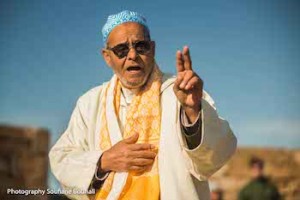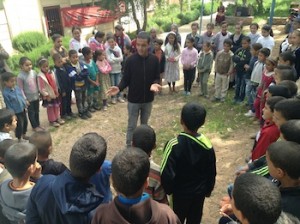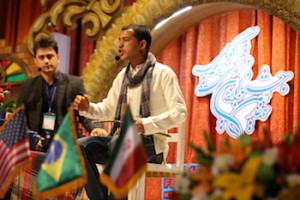Storytelling is experiencing a revival in many Western countries right now, but the tradition of oral storytelling, or hikayat, in Morocco is almost 1,000 years old. Morocco has a strongly oral culture – everything from recipes to stories to legal agreements have been passed down from generation to generation in the absence of the means to record such information and against the backdrop of widespread illiteracy. In the past, storytellers travelled around to perform in public places and at community events and palace celebrations. They were not only a form of entertainment – they were also used by the authorities to pass information and moral messages. In today’s era of satellite TV and the internet, storytelling is a dying art. Although visitors to Marrakech may find the odd storyteller on Place Jmaa el Fna, the crowd around them is smaller than ever and because the stories are told in Arabic or a Berber dialect, the performers cannot attract the support of foreign tourists.
Today, Cafe Clock in the Kasbah district of Marrakech is the perhaps unlikely bastion of this oral tradition. Both the cross-cultural cafe, with modern graffiti on the walls and the best camel burger in town on the menu, and the storytelling program based there, were developed by Mike Richardson, the cafe’s British owner. Since December 2013, even before the second branch of Cafe Clock officially opened its doors in Marrakech that March (the first is in Fez), a group of young, enthusiastic Moroccans had gravitated around master storyteller, ‘Haj’ Ahmed Ezzarghani. Since then, they have been working hard to preserve the storytelling tradition and bring the old stories and fables to a wider audience. Haj collected stories during his work as a travelling salesman and performed them in the turbulent 1950s outside Bab Boujloud in Fez.
Haj meets with his young apprentices three times per week at Cafe Clock. At the first meeting, Haj recounts a story, which the apprentices translate into English and practice. The next time they meet, they perform the story in English and Arabic for the group. Haj doesn’t understand much English, so the young storytellers help each other out and he critiques the theatricality of their performance. On the third meeting, they perform the story for the Cafe Clock audience.
There is a core of four apprentice storytellers, who are all students of English in Marrakech. Jawad Elbied, 24, is just finishing his English degree with a dissertation in Moroccan Storytelling. He says: “Storytelling has a special value in Moroccan society, but young kids today don’t know the stories – they are only interested in the internet and YouTube. Haj reminds me of my grandfather and his generation. He reminds us of our origins.” It is clear that storytelling has benefitted Jawad and his fellow apprentices. He speaks confidently and eloquently in English and twice a week he does so before a large crowd at Cafe Clock. Furthermore, through the Hikayat Program, which is in the process of becoming a non-profit association in Morocco, he has had the opportunity to travel around Morocco and even to Iran to share the stories and teach them to others. The storytellers have also appeared on the UK’s Channel 4 and on Al Jazeera.
“The value of stories is that they enable the audience to create their own film; to imagine the characters and the action in their own way,” Jawad explains. “We need to reach out to new audiences by being creative and offering attractive stories.” Through the association, the storytellers hope to use modern technology to diffuse the stories and record them for future generations.
If you would like to hear the stories, they are performed on Monday and Thursday evenings at 7pm Cafe Clock Marrakech. As well hearing the apprentices in English, visitors also have the opportunity to see Haj in action. Even for those who don’t understand Arabic, his performance is a piece of theatre, a relic of a bygone era brought to life and definitely worth seeing! The Storytelling Program has also been extended to Cafe Clock in Fez, where a group of apprentices works with a local master storyteller. The Hikayat Morocco group is also available for performances and workshops and can be contacted via Cafe Clock or via their own website Hikayat Morocco.
Recommended Reading: The Last Storytellers, Richard Hamilton
For more information about Storytelling at Café Clock
Written by Lynn Sheppard
Lynn Sheppard has lived in Essaouira, on Morocco’s Atlantic Coast for more than 2 years, supporting local non-profits, writing and becoming an expert on all things Swiri (ie. Essaouiran). She blogs at Maroc-phile.com and for other travel industry clients.
For more information about Storytelling in Morocco or the Art of Hikayat on a Marrakech Tour





